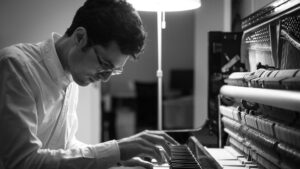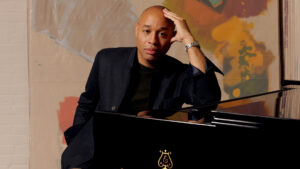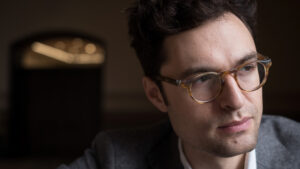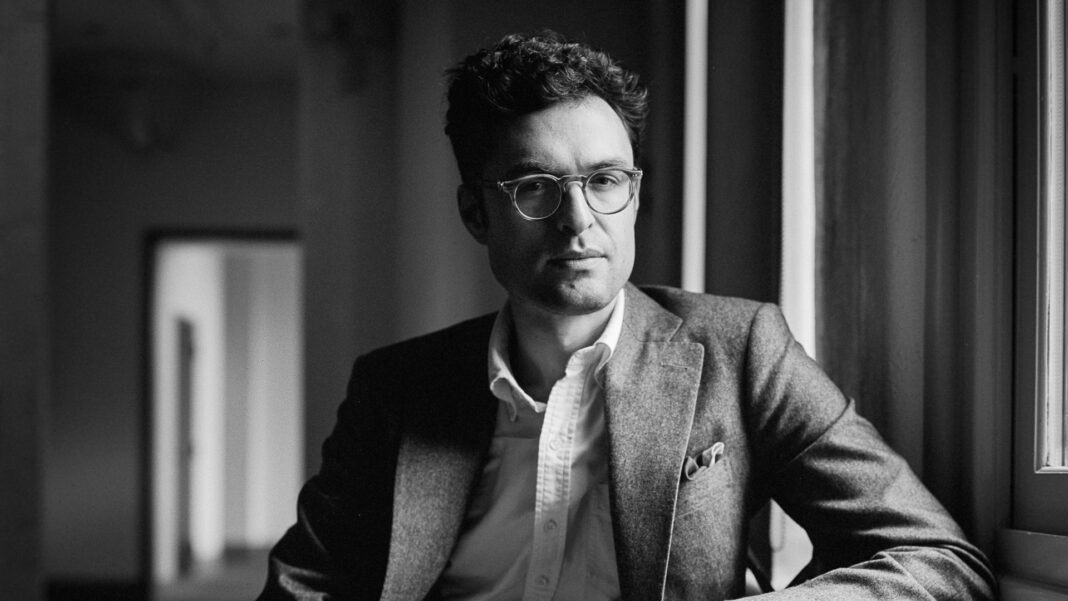
Call it good timing or a lucky alignment of circumstances. But given that very little is just pure luck anymore, I’ll suggest that composer/pianist Timo Andres and his team knew exactly what they were doing when they lined up the release of a new album on Nonesuch Records, the world premiere of his fifth piano concerto, Made of Tunes, with the Los Angeles Philharmonic and his perform with five other pianists at Walt Disney Concert Hall of the 20 etudes by Philip Glass. All in one week.
On March 19th, Andres joins fellow pianists Anton Batagov, Lara Downes, Jenny Lin and Maki Namekawa to perform Glass’ Etudes 1-20. On March 22nd, Nonesuch Records releases The Blind Banister. That’s Andres’ recording of his third piano concerto. it also includes his Colorful History and Upstate Obscura. That same day the Los Angeles Philharmonic will give the world premiere of Made of Tunes which Andres composed for pianist Aaron Diehl. John Adams conducts all three performances at Walt Disney Concert Hall.
That gave me plenty to discuss with Andres when we spoke last week. What follows are excerpts from our conversation that have been edited for length and clarity. To watch the full interview with Timo Andres, please go to our YouTube channel.
Q: Made of Tunes was commissioned by the Los Angeles Philharmonic and you composed it with Aaron Diehl in mind as the soloist. What are the qualities that Aaron Diehl possesses as a pianist that most influenced how and what you composed for him?
That’s a great question. Whenever I write a piece for anyone, I’m trying to think of their specific qualities as a performer and how I can sort of highlight those and work with those and bring them out. In the case of Aaron, I’ve known him about a decade now. I’ve heard him play many, many times. His sound and his style was very much in my ear. And also his repertoire, because I think the music that he chooses to play and that he engages with has been as much a part of his voice as anything.
That really is kind of a broad history of American piano music going back to the earliest ragtime and the stuff that we would pinpoint as saying, this music sounds American for the first time as opposed to European. That whole tradition is very inspiring to me as well. I’ve always felt myself to be specifically an American composer.
On your website, you wrote that “Aaron’s part includes opportunities for improvisation, sections in which I pass him a tune or rhythm or harmony, and he responds with something I wouldn’t have thought of.” How much freedom does he have to improvise? Which I guess is in the tradition of cadenzas going back to Beethoven’s day.

What I’ve tried to do is a little bit trickier and a little bit, certainly rarer, in that I don’t actually have an improvised cadenza. The section that you would maybe call a cadenza is completely written out. And the improvised sections are actually playing with the orchestra. That, to me, was more interesting in a way, because it’s very much what one hears Aaron do when he’s playing with a singer or a trio or in an ensemble. It’s that responding to the other people. Not just responding to the musical cues, but responding to what else is going on in the room.
The orchestra part is totally written out. I had an idea that I would maybe be able to incorporate some improvised or aleatoric bits in the orchestra part, but it’s really just too risky in terms of portability.
The orchestra is remaining on course with the notated music. Then Aaron, I always pass him something, whether that’s a chord or a series of chords or a melodic motif or literally just verbal instructions. I’m always giving him something to go on and that is very much how improvisation typically works. It’s not this idea of total freedom. You’re using certain frameworks and then replacing the things on top of those frameworks with your own ideas. That’s the skill of a great jazz improviser and that’s what I wanted to give Aaron the opportunity to do.
As you were composing the piece, were you allowing yourself to play with some improvisations you might come up with if you were the soloist?
I’m not an improviser. I do improvise as part of my compositional process sometimes, but it’s not a huge part of it. I think that’s one of the things that fascinates me and that I’m slightly in awe of with Aaron and people who can who can really do that on such a high level.
Maybe one day down the road I will end up performing this piece myself. In that case, I’m not quite sure what I’ll do in those sections. I may give myself a little bit more of a written framework; leaving some flexibility for what may happen in performance. But I don’t have that kind of confidence to give myself that total freedom in front of other people.
Do you have the confidence to add sociopolitical statements in your work? The reason I ask is in the description of Made of Tunes on your website you talk about the second movement, American Nocturnal, having six variations of original theme. That was all taken from a mishmash of the notes used in “the hokey patriotic song America the Beautiful.” Is that something that allows you to hold a mirror up to who we are as a country, by taking those notes so closely associated with how we present ourselves patriotically?
It’s not something that I want to make explicit. I would say that the whole piece sounds very American to me. I think the way that the piece ends, perhaps, says more than I want to say in words about that. When you hear what happens in the end, you can draw your own conclusions. I think the final orchestral gesture basically feels apocalyptic.
I read an article an interview that you gave the L.A. Times in 2009 when the L.A. Philharmonic was giving the premiere of Nightjar. You mentioned that you were obsessed with John Adams. The title for Made of Tunes is derived from a lyric in a Charles Ives song (The Things Our Fathers Loved). Adams, who is conducting the premiere, wrote a piano concerto called Must the Devil Have All the Good Tunes? Is there a wink and a nod to John Adams built into the title?
Absolutely. Of course, John has a piece called My Father Knew Charles Ives and I know [him] as an admirer of Ives’ songs. John’s music was, and is, a huge influence on me. We’ve both developed and changed so much as composers even over the past 15 years. I think there is an aspect that we share in this sense of Americanness and this sense of a fluidity between all of these different kinds of music that make up the American identity. I think maintaining that fluidity is very important to both of us. I think you’ll hear a kind of rhythmic drive, especially in the first movement, that I very much think of as being something I learned from John’s music.
As we’ve been working on the piece together he actually told me yesterday that there’s something in it that reminded him of a song of his called I Was Looking at the Ceiling and Then I Saw the Sky. Which is a little bit of what you might call a cult classic among John’s works.
I that same story in the LA Times you said about the LA Phil’s commission of Nightjar, “If you would ask me what my absolute dream commission would be, I probably would have said something along those lines. I mean, it’s Los Angeles. They’re pretty much where it’s at in terms of good music.” How has your perspective evolved since that time and where you are today with this new commission from the LA Phil?

It really feels like part of the same journey in a way. That Green Umbrella commission was one of my first commissions period – from anyone. It happened when I was still in grad school which was a vote of confidence in a way.
With everything that’s happened in the past few years, it seems like orchestras might be having a little bit of a tougher time. In general I see a kind of retrenchment into a kind of artistic conservatism.
For someone like me who’s a composer and an enthusiast of anything that’s new, that can be a little bit discouraging. But I do see the commission of this new concerto as kind of bucking that trend.
It’s actually my first subscription series appearance with the Phil. And my first piece that I’ve written for the full orchestra. It’s still a dream ensemble. They’re the the most new music friendly of the major American orchestras by far, and I think the most comfortable with a lot of the more demanding things that new music in general, and my piece particularly, asks of them.
Nonesuch Records is releasing your new album, The Blind Bannister on the same day that this concerto is having its world premiere. That’s a concerto that had its world premiere in 2016. How has your relationship with that piece evolved? How did that influence how you chose to perform it?
The Blind Banister is my third piano concerto and Made of Tunes is my fifth. So it’s kind of a week of piano concertos here. The Blind Banister was also a piece that was written specifically for Jonathan Bis. I think that piece has much more to do with a kind of classical romantic lineage and how I place myself in that as a 21st century American. I just performed the piece last month; four times in Oregon.
It’s still, I think, a piece where I figured out certain things compositionally that I can mark as a tent pole in my catalog in a way. I think formally I tried some things in that piece that I had never tried before. It’s this continuous 20 minute stretch of music, which I think at the time was the longest continuous stretch of music that I had attempted to write. I think, in general, it succeeds at articulating that amount of time in a way that’s compelling and that leads the listener through a kind of journey. It has its particular demands and difficulties and sections that are tricky to put together and balance. But the rhetoric of the piece and the formal journey of it kind of explain themselves.
During your recent NPR Tiny Desk concert of Philip Glass’ Etudes you performed etudes six and five in that order. On March 19th you’re going to be performing at Walt Disney Concert Hall as one of five pianists doing Philip Glass’ Complete Etudes 1 – 20. You edited the published edition that recently came out. When you’re working on something from an editorial perspective are there new discoveries that you were able to make, new understandings, that are separate from what you understand as you’re playing a piece of music?
I’m someone who’s very grounded in notation. I think already that puts me in the minority of musicians in the world. Most music is not made via notation. Notation is not only how I deal with music most of the time, but it’s inescapably how I think about it. Like when I hear music, I’d see notation and vice versa. All the music that I interface with I understand something more of it by seeing the notation. Very often, especially when I’m playing new work, I will actually go and re-notate certain things. Not because it’s notated wrong. It’s just there’s certain opinions that I hold, esthetically or taste wise, or just from a practicality standpoint that are sort of the differential between how a composer might think of a piece, might conceive music and then the ways that a pianist might approach that music.
With Philip, I think his notation always has a wonderful kind of clarity to it. So it wasn’t so much about clarifying anything in particular. You can read these pieces off his hand-notated manuscripts, pretty much with no problem. This was more about meeting somewhere in the middle between a totally liberalized, typesetting of those manuscripts and then reading from the manuscripts. I think there are aspects of both documents that are useful.
You posted on your website on January 4th of 2023, “Thanks to all the artists and record labels who asked me to write about their recordings. Doing so always teaches me new ways to listen and think about music.” If we fast forward 30 or 40 years and somebody is editing your work or asking to comment on them, what would you like them most to know about who you were at this particular time in your life as a person, a composer and an artist?
I’m not really someone who likes to self-mythologize. I don’t think autobiographically. It’s not really a question I’m prepared to answer. And I don’t think it’s my job to answer it. I think of myself as someone who works very hard. My life is really about all the different aspects of the work that I do. Whether it’s writing a piano concerto or playing the work of another composer, or writing about the work of other musicians, arranging the work of other musicians. All of these different ways that I can get my hands dirty with music, so to speak. I’m up for it and I don’t stop to really interrogate what my project is in a sense for or even who I am. Do any of us really know who we are?
I think when you start to think about that, you’re becoming your own publicist. In a way you’re marketing yourself. Which is a necessity in the modern world of constant pressure to be sharing content and sharing yourself online and simultaneously the complete destruction of any kind of critical apparatus in the mainstream press or any real critical discourse that goes on in the mainstream. In the field that I work in it’s tempting to try to pick up the pieces and try to do it yourself. I have a website. I have Instagram. I have Twitter. I do all these things. But I also don’t know if they truly say anything about who I am as an artist. I think I would rather leave it to the professionals to come to their own conclusions.
Or let the music speak for itself.
It’s a little bit cliche to say, I guess, but yeah, listen to the music. If you’re curious, it’s all in there. I don’t think it says particularly anything autobiographical. I’m not that kind of composer. But, I think you can connect the dots if you really listen.
To watch the full interview with Timo Andres, please go here.
Main Photo: Composer/Pianist Timo Andres (Courtesy Colbert Artists Management)














